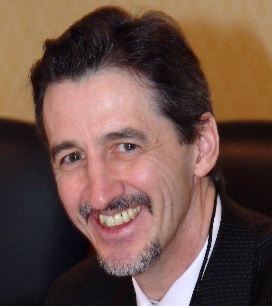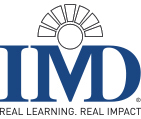- Learning
An MBA with Social Impact
New MBA Dean Seán Meehan describes what makes the IMD MBA program unique
IMD business school is unique in the world of executive education, having no affiliation with a university and not offering its professors tenure. It is focused on real-world executive development — working with individuals, teams and organizations to resolve their issues, build capabilities and prepare them for the future. This uniqueness is what attracted the new Dean of the MBA program, Seán Meehan, to the school when he joined it in 1997.
In addition to his teaching and research, Meehan, Martin Hilti Professor of Marketing and Change Management, has worked closely through the years with a wide variety of major companies, from the Agricultural Bank of China to Toyota. For the past four years, he led IMD’s most senior leadership program, Breakthrough Program for Senior Executives (BPSE), before returning to the position he originally held from 2002-2005. “I feel very excited and enormously privileged to be able to come back to the MBA program after so many years,” he says.
The Big Jigsaw
Although the new position changes his portfolio significantly, Meehan believes that all of IMD’s activities are connected by the school’s singular focus on leadership development. “What makes the IMD MBA special is its approach to leadership development,” he says. “We develop students for a purpose. Our program is not a factory line producing uniform MBAs. Every one of our class members has a unique and special profile. They have different talents and ambitions. What unites them is their global mindset. That’s why companies recruit from the class. They have really interesting profiles, and are all truly globally minded.”
The MBA is a different brief to the customized programs he has designed and led for some of the world’s largest companies, but he says, “It’s part of the same, big jigsaw.”
In many ways, the MBA applicants who survive the arduous selection process (“We spend a lot of time with prospective candidates before making our offers,” Meehan says) are likely to become the type of senior leaders who later return for the BPSE and other senior leadership programs at the school. Fighting for a place in the program — there are only 90 open spots annually — “is a signal that they are committed to really having an impact on our world, on our society,” he says. “It’s not good enough for them to just dawdle along and be a manager. They want more.”
The average age of the students is just shy of 31 years of age, which as Meehan explains is a crucial time in the career of an ambitious leader. Leaders who have the potential to reach the very top rungs of their company are typically identified by the organization by the time they reach their late 30s, he says. “What we want to do in our one-year program is to take an already attractive trajectory, pause it for that one year of investment, and then restart the career with a higher trajectory, a better and steeper trajectory,” he says. “So they're going to move faster and further in the subsequent seven years, because between 31 and 38, things have to happen.”
What Does It Mean to Be a Leader?
If leadership development is the overriding mandate of a program, then the first question to ask is, “What does it mean to be a leader?” As Meehan notes, the answer to this question has evolved over time. “If we didn't change what our view of what it takes to be a leader, or rather our view of what world that leader needs to be effective in, then we're not doing a good job,” he says.

According to Meehan, one of the vital elements of leading in the future is to have an entrepreneurial mindset. The MBA program must equip students to be great entrepreneurs, he says. As Meehan explains, “Whether they're working in a big, complex corporation or not, they need to behave like entrepreneurs,” Meehan says. “That's what companies expect. Every company I know talks about agile, nimble, responsive, open systems, non-hierarchical structures — all the things that you find in startups essentially. Big, big companies now want to embrace that; that's the future, and that's what we're helping our students prepare for.”
Another key element of leadership is being digital. “It’s not that we say they should become the guru of digital in their organization,” he says. “But they’re going to have to do business in a digital world where all organizations are optimized for digital opportunities. And indeed, trade is done in a very different way. So they need to be savvy on these issues.”
But perhaps the defining characteristic of the leaders of today and tomorrow is a global mindset. As Meehan explains, the “corporates” in this world — by which he means organizations involved in commerce, not just publicly traded companies — “know they have to do business globally.” It doesn’t matter that political trends today are pushing countries to turn inward, he says. There will always continue to be active trade. In fact, he notes, “the wealth and development of our societies will be, essentially, funded and fueled by the progress that the trade or commercial actors in our society manage to achieve.”
One of the key selling points of the students in IMD’s MBA program, as mentioned above, is their global mindset and experience. The global mindset is reflected in the incredible diversity of each class. For example, 43 different nationalities are represented in this year’s class of 90 students. “No program that I know of has those kinds of numbers,” Meehan says. “This is the most diverse MBA program in the world.”
The national diversity extends to the faculty, which includes 26 different nationalities — and he notes that he does not mean family heritage, but people born and raised in other countries. Meehan himself has an international background. Born in Ireland and educated in Dublin and Manchester, he worked in London and Boston, then returned to London to earn a PhD from London Business School before landing in Lausanne. He has since become a naturalized Swiss citizen. “I’m Irish by birth and Swiss by choice,” he says.
IMD’s widely diverse student and faculty population from so many countries emphasizes that the Swiss-based school has an identity that, unlike any other school, floats above national borders. “There's no issue of us being an American school or a European school,” Meehan says. “Our outlook is global.”
An Intimate, Personalized Experience
For Meehan, successfully helping students, through the offered courses, acquire the skills, attributes and mindset expected from leaders of the future does not end IMD’s engagement with them. In the context of the crucial decade that awaits them, IMD works hard to help them plan their careers for their 30s to put them in the best position to reach their goals.
By the third week of the program, Meehan says, “we are beginning work with them on their career development strategies, in what we call the career services stream. Career services is an integrated element of the program, like accounting and finance, it’s not periphery or adjunct.” Over time, career coaches lead the students through a series of career development stages, from sharpening their goals to building career skills such as interviewing, using social media for searches, and developing a brand. Reflecting the depth of its commitment to the success of its students, the IMD MBA students benefit from input and perspective from team coaches, career coaches and also Jungian analysts. During some individual 20 sessions with the Jungian analysts, they explore what their real motivations are. After, they understand much better why they are driven as they are, and where they want to get to. This leaves them better equipped to deal with trade-offs and conflicts that may arise as they evaluate a variety of very different job offers.
IMD also uses its connections with all of the alumni and executive program participants and their organizations — some 9,000 people located in 98 countries in total every year, Meehan estimates — to help guide students toward the best career they can have.
"It’s more about a career strategy than a ‘find-me-a-job’ strategy,” Meehan emphasizes. “Our job is not done when they find a job. Our job is done when they have figured out what career they’re trying to have, really want to have, and feel equipped and confident that they can be successful in.”
With just 90 students, a 2-1 faculty-student ratio, and an ultimate goal of launching its students on a new, higher career trajectory even if it requires Jungian analysis, the IMD MBA program seems to be, indeed, what Meehan describes as “an intimate, personalized leadership development experience.” “It’s so much more than an MBA,” he says. “Our students get such amazing feedback and support. We are more than happy to open doors for them. Their success is our success.”
IMD is a top-ranked business school, expert in developing leaders, transforming organizations and creating immediate and long-term positive impact.
ARTICLES YOU MIGHT LIKE
VIEWPOINT
CCL’s approach to preparing executives for impactful leadership at the organizational level
DEVELOPING LEADERS QUARTERLY MAGAZINE AND WEEKLY BRIEFING EMAILS

































